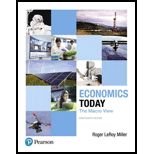
Why was it more efficient to end the quota? Why do you think that people usually accept money in exchange instead of engaging in barter of one good for another every time they trade?
Concept introduction:
Quota, in international trade is a government-imposed limit on the quantity, or in exceptional cases the value, of the goods or services that may be exported or imported over a specified period of time.
Amounts are more successful in limiting exchange than taxes, especially if household interest for a product isn't delicate to increments in cost.
The difficulty with a barter system is that in order to obtain a particular good or service from a supplier, one has to possess a good or service of equal value, which the supplier also desires.
At the end of the day, in a trade framework, trade can happen just if there is a twofold fortuitous event of needs between two executing parties.
Money effectively eliminates this double coincidence of wants problem by serving as a medium of exchange that is accepted in all transactions, by all parties, regardless of whether they desire each others' goods and services.
Want to see the full answer?
Check out a sample textbook solution
Chapter 32 Solutions
Economics Today: The Macro View (19th Edition) (Pearson Series in Economics)

 Principles of Economics (12th Edition)EconomicsISBN:9780134078779Author:Karl E. Case, Ray C. Fair, Sharon E. OsterPublisher:PEARSON
Principles of Economics (12th Edition)EconomicsISBN:9780134078779Author:Karl E. Case, Ray C. Fair, Sharon E. OsterPublisher:PEARSON Engineering Economy (17th Edition)EconomicsISBN:9780134870069Author:William G. Sullivan, Elin M. Wicks, C. Patrick KoellingPublisher:PEARSON
Engineering Economy (17th Edition)EconomicsISBN:9780134870069Author:William G. Sullivan, Elin M. Wicks, C. Patrick KoellingPublisher:PEARSON Principles of Economics (MindTap Course List)EconomicsISBN:9781305585126Author:N. Gregory MankiwPublisher:Cengage Learning
Principles of Economics (MindTap Course List)EconomicsISBN:9781305585126Author:N. Gregory MankiwPublisher:Cengage Learning Managerial Economics: A Problem Solving ApproachEconomicsISBN:9781337106665Author:Luke M. Froeb, Brian T. McCann, Michael R. Ward, Mike ShorPublisher:Cengage Learning
Managerial Economics: A Problem Solving ApproachEconomicsISBN:9781337106665Author:Luke M. Froeb, Brian T. McCann, Michael R. Ward, Mike ShorPublisher:Cengage Learning Managerial Economics & Business Strategy (Mcgraw-...EconomicsISBN:9781259290619Author:Michael Baye, Jeff PrincePublisher:McGraw-Hill Education
Managerial Economics & Business Strategy (Mcgraw-...EconomicsISBN:9781259290619Author:Michael Baye, Jeff PrincePublisher:McGraw-Hill Education





